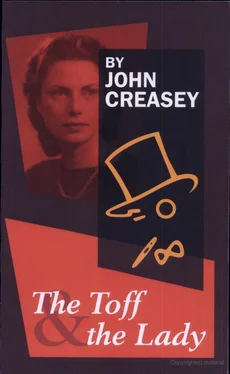John Creasey - The Toff and The Lady
Здесь есть возможность читать онлайн «John Creasey - The Toff and The Lady» весь текст электронной книги совершенно бесплатно (целиком полную версию без сокращений). В некоторых случаях можно слушать аудио, скачать через торрент в формате fb2 и присутствует краткое содержание. Жанр: Старинная литература, на русском языке. Описание произведения, (предисловие) а так же отзывы посетителей доступны на портале библиотеки ЛибКат.
- Название:The Toff and The Lady
- Автор:
- Жанр:
- Год:неизвестен
- ISBN:нет данных
- Рейтинг книги:5 / 5. Голосов: 1
-
Избранное:Добавить в избранное
- Отзывы:
-
Ваша оценка:
- 100
- 1
- 2
- 3
- 4
- 5
The Toff and The Lady: краткое содержание, описание и аннотация
Предлагаем к чтению аннотацию, описание, краткое содержание или предисловие (зависит от того, что написал сам автор книги «The Toff and The Lady»). Если вы не нашли необходимую информацию о книге — напишите в комментариях, мы постараемся отыскать её.
The Toff and The Lady — читать онлайн бесплатно полную книгу (весь текст) целиком
Ниже представлен текст книги, разбитый по страницам. Система сохранения места последней прочитанной страницы, позволяет с удобством читать онлайн бесплатно книгу «The Toff and The Lady», без необходимости каждый раз заново искать на чём Вы остановились. Поставьте закладку, и сможете в любой момент перейти на страницу, на которой закончили чтение.
Интервал:
Закладка:
Rollison found himself in the hall, with Hilda chattering all the time. The footman appeared from a doorway and opened the door. Hilda repeated how delighted she was that he had called and how she hoped that he would come again soon— and then Rollison found himself on the porch, with the door closed firmly behind him, and a feeling of great disquiet in his mind.
The disquiet continued.
The lost lady did not die, and the doctors said that she would be able to leave the nursing home by the end of the month. There were no further attempts to attack her. Phyllis Armitage resigned from her post, and, as far as the police and Rollison were able to find out, did not seek other work. Her sister came to stay with her at the flatlet.
On the day after Rollison’s burst of activity, Grice went to the offices of Pomeroy, Ward & Pomeroy. The two firms were in many respects as one, and had the same principals. Grice was received by a pompous, well-dressed gentleman who denied all knowledge of the sporting gent, but admitted that Marcus Shayle was his head clerk. Shayle had not come to the office that morning.
He did not come to the office that afternoon, nor on the following days. The police found no trace either of him or the man in coloured check tweeds. Messrs. Pomeroy, Ward & Pomeroy, Grice told Rollison, were very correct in their behaviour, and professed to be puzzled by the disappearance of their head clerk.
The Barrington-Leys left London for their Sussex home. On the two occasions when Rollison tried to get in touch with Gwendoline, he failed—and obviously she meant him to fail.
In all thirty-five people wrote to Scotland Yard or called there in person, declaring that they had recognized the photograph in The Record. The lost lady was variously described as a Pole, a Czech, a Russian, a Greek and a French Countess, the wife of a grocer’s assistant, a school-mistress, a spiritualist medium, an obscure musical comedy star, the winner of a beauty competition a few years ago and other things, but none of the claims could be substantiated. The only two people who gained the ear of the police could not name her, but said that they had seen her in a small restaurant in Soho, where she had dined in a secluded corner on three successive nights before her appearance at Barrington House. Grice went himself to see the proprietor, and arrived when the lady in question was in her secluded corner, vaguely like the woman of the photograph; she was a mannequin at a West End store.
“It can ’ t just peter out,” said Rollison, glumly.
He tried to find out what loans Barrington-Ley was financing, but no one in the City was able to give him reliable information. There was a vague rumour that Barrington-Ley was not well, but there were no open suggestions that his fianances were in bad order. Friends had advised him to rest, which was why he was out of London, but he visited the City two or three times a week and maintained a regular correspondence with his office.
Then dawned the thirtieth of September.
Never had Jolly known Rollison in such poor spirits over so long a period. Seldom had he spent so many evenings at home, renewing, he said, his acquaintance with the older poets, but often sitting with a book open in his hands and obviously pondering over more recent matters. On the twenty-ninth of September, Jolly, almost distraught, clung to the hope that a regimental dinner would cheer him up. It did—and, walking along the wide passage of the officer’s club he saw Grice.
“Great Scott!” he said. “Have you joined the Army?”
“Where is she?” demanded Grice, sharply.
“Who?” inquired Rollison.
“Rolly, you’ve gone too far this time. Where is that woman?”
“Which woman?” asked Rollison, but the smile left his face and his mind flew to the unconscious woman of the pale face and the lack-lustre eyes.
Grice, who was breathing rather heavily, rested a hand on his arm. Only a serious matter would have made him brave the lion’s den and go through the obstructionist ceremony which all without a special pass were compelled to endure downstairs.
“The woman has disappeared from the nursing home,” he said, with great care. “The matron says that she had a letter from you, and within an hour she had gone. She dressed in the evening gown in which she was first found, as she had no others. She wasn’t fit enough to travel far. Where have you taken her?”
Rollison said: “Is the nursing home watched?”
“That’s nothing to do with it.”
“It’s a lot to do with it,” said Rollison. “If it were watched your men either fell down on the job, or else she went out dressed very different from what you say. Had you a man on duty?”
“Two,” said Grice.
“Then probably she didn’t go out in an evening gown,” said Rollison, hurrying along the passage with a hand on Grice’s arm, “and she certainly didn’t get a letter from me.”
“She did,” said Grice. “I’ve seen it.”
CHAPTER EIGHT
THE TOFF HAS A VISITOR
THE letter, which was soon established as a forgery, said so little that Grice admitted that there was no real reason for thinking that it explained the woman’s disappearance. In fact as they went to Grice’s office, Rollison came to the conclusion that the Superintendent had never been really convinced that he was behind it, but had drawn a bow at a venture.
The letter said that Rollison knew the woman’s identity.
Grice said: “Do you?”
“No,” said Rollison.
“You haven’t sat back and counted chickens this last three weeks, have you?”
“I’ve got no practical results,” said Rollison. “Have you?”
“None at all.” admitted Grice. He sat back, worriedly. “I know no more about her now than I did when she first appeared, but at least one attempt has been made to murder her, and I am afraid of what might happen next. We might find her body. Why were you so interested in the Barrington-Leys?”
“Because she turned up at their house.”
“You know the family well, don’t you?”
“Fairly well.”
“Why did they suddenly leave London?”
“I haven’t a notion.”
“The daughter came to see you on the day you first heard of the affair, didn’t she?”
“Yes.”
“What about?”
“I don’t see why this interests you,” said Rollison, “but she came because she didn’t want her mother to dispense charity on this woman. She thought I might be able to say enough to discredit Lady Lost.”
“That’s pretty thin,” said Grice. He leaned forward. “Rolly,
there are times when personal loyalty has no place in one’s actions. If you are hiding, or trying to hide, anything about the Barrington-Leys, you are making a big mistake.” He paused, then asked tersely: “Is Barrington-Ley in difficulties?”
“Not to my knowledge,” said Rollison.
“Did you know that they’ve recently used Pomeroy, Ward & Pomeroy for most of their audit work?”
“Yes,” said Rollison.
“Then why the devil didn’t you tell me?”
“I thought it was general knowledge to the police if not to the public.”
“I doubt that,” said Grice, still bad tempered, “but I suppose I’ll have to accept your word for it.” He stood up. “Rolly, we’ve worked together a lot and I’ve always given you your head when I could. I hope you won’t let me down this time. You know something more than you admit, don’t you?”
“Nothing that even remotely concerns the police,” said Rollison. “I have told you of the little fat man who was with Marcus Shayle—have you traced him yet?”
“No,” said Grice, sourly, “although I think he is a Pomeroy. The principals aren’t too happy about him.”
Читать дальшеИнтервал:
Закладка:
Похожие книги на «The Toff and The Lady»
Представляем Вашему вниманию похожие книги на «The Toff and The Lady» списком для выбора. Мы отобрали схожую по названию и смыслу литературу в надежде предоставить читателям больше вариантов отыскать новые, интересные, ещё непрочитанные произведения.
Обсуждение, отзывы о книге «The Toff and The Lady» и просто собственные мнения читателей. Оставьте ваши комментарии, напишите, что Вы думаете о произведении, его смысле или главных героях. Укажите что конкретно понравилось, а что нет, и почему Вы так считаете.












